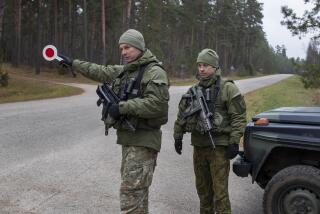Lithuania Debates Independence Freeze : Secession: A moratorium would end an economic blockade and get Kremlin talks started. But some lawmakers fear Moscow trickery.
- Share via
VILNIUS, Soviet Union — Lithuania’s legislators began debating a freeze of their declaration of independence Thursday, and some doubted that Mikhail S. Gorbachev has the credibility or staying power to stick to a compromise.
Lithuanian Prime Minister Kazimiera Prunskiene told the Supreme Council (Parliament) that Gorbachev had promised to end an economic blockade and begin negotiations if Lithuania puts a moratorium on the March 11 declaration.
She suggested a resolution that would impose a three-month moratorium, to take effect when negotiations with the Kremlin actually begin. Prunskiene told the council that Gorbachev will not require a freeze on laws that followed the declaration of independence. One of those laws replaced the Soviet constitution with a Lithuanian document.
“The moratorium is only on the declaration of independence, not on all the other acts,” Prunskiene told Parliament. “It’s a political statement.
“The status of Lithuania doesn’t change and the Supreme Council remains the same,” she added, pressing Parliament to accept a compromise.
Parliament adjourned Thursday without making a decision, but Prunskiene’s assurances were not enough for many legislators.
“We fear that if we accept this, Moscow would immediately install an alternative government,” legislator Klemas Inta said.
Lithuania was an independent country between the two world wars but was occupied by Soviet soldiers in 1940 and absorbed into the Soviet Union under a secret pact with Nazi Germany.
Newspaper editor Algis Cekuolis said, “There is a panic in the country that we might be tricked.”
Inta pointed to a stack of letters Parliament has received from people opposing any suspension of the declaration of independence, despite the Kremlin’s blockade.
About 50,000 workers have lost their jobs since the Moscow government cut all oil, most natural gas and other raw materials and manufactured goods 10 weeks ago. The blockade is barely visible in Vilnius, the Lithuanian capital. Most workers still are earning vacation pay, hot water is flowing and there is no need for heat.
As a result, there is little sign of the economic sanctions wearing down the republic’s determination.
Several hundred people gathered outside Parliament during the debate Thursday to protest the moratorium proposal.
“You cannot give yourself up into captivity,” engineer Richardas Nomicas said. “A compromise is needed, but this is not it.”
Prunskiene told Parliament that it must accept a deal because the West is demanding a compromise. She also said that the economic blockade could turn Lithuania into a disaster area by winter.
The Kremlin released a statement late Tuesday saying that talks with Lithuania cannot begin until the republic declares a moratorium on its independence declaration. It said the talks can only be held in the framework of a nationwide discussion of a new treaty of union among republics.
Lithuania’s president, Vytautas Landsbergis, told Parliament that he would speak in more detail on the proposed deal today.
On Thursday, Landsbergis did not endorse a compromise but said, “It’s most important to get the negotiations started.” In response to a question, he said he understood from talks with Gorbachev that the economic blockade would be lifted immediately when the moratorium went into effect.
Landsbergis said that Lithuania’s leaders want to choose the best conditions for entering critical talks over just how independence can be achieved.
There was no indication when Parliament would make a decision.
More to Read
Sign up for Essential California
The most important California stories and recommendations in your inbox every morning.
You may occasionally receive promotional content from the Los Angeles Times.












